
Robert Martin
- Untitled (Illuminated Votive)
- 2025
- ink on paper
- 17×24 cm
- courtesy of the artist
When separated from their colony, army ants83 are so focused on following each other that they trap themselves in a circular mill. They run towards a non-existent goal until they die.84
- Labidus praedator
- Hölldobler & Wilson, 1990

Sara Yukiko
- Dining Table
- 2022
- Digital print on canvas
- 50×60 cm
- courtesy of the artist
Digging as deep as seven meters into the ground, Leaf-cutting ants79 build enormous cave systems with thousands of rooms.80 The central chamber can be large enough for a human to sit in.81, 82
- Atta
- It's difficult to grasp the sizes of these underground nests relative to an individual ant. One colony was recorded excavating 40 metric tons of soil.
- Hölldobler & Wilson, 1990
- Moser, 2006
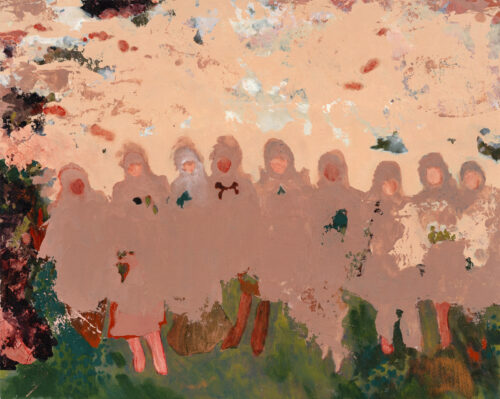
Emily Rose Wright
- Ring
- 2025
- oil on panel
- 41×51 cm
- courtesy of the artist and Harkawik
The ant Mycocepurus smithii can perform virgin births. Most colonies are populated entirely by female clones, with no males in sight.77 Once a queen gives up sex, the switch is irreversible: none of her descendants will ever mate.78
- Sexual populations do exist, but they are very rare. Asexual colonies spread more widely because queens don't depend on males.
- Rabeling et al., 2011

Corey Olsen
- Sand
- 2025
- photograph
- courtesy of the artist
Driver ants74 cover slugs in soil to soak up their protective slime. Once dry, the slug gets sliced up and eaten.75, 76
- Dorylus laevigatus
- Berghoff, 2002
- Lucas, 2006

Caitlin Keogh
- Knots Knot Knots
- 2020
- Flashe and acrylic on panel
- 58×43 cm
- courtesy of the artist and Bortolami Gallery
Asian weaver ants71 build living chains by holding each other at the waist.72 They dangle across tree branches to close gaps between trails or to explore new areas.73
- Oecophylla smaragdina
- Chains can span as far as 10 cm, 15 times the length of a worker.
- Carlesso et al., 2023
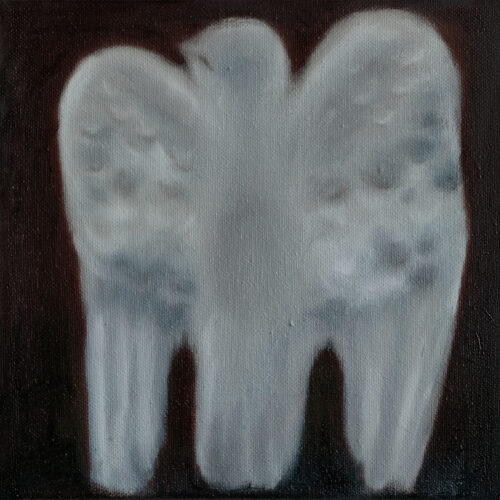
Sophie Vallance Cantor
- Paloma
- 2024
- Oil on canvas
- 20×20 cm
- courtesy of the artist
A queen ant only ever sees the sun once in her life, during her nuptial flight.68 Once mated, she sheds her wings and spends the rest of her days underground, laying eggs.69,70
- According to research conducted on Messor and Pogonomyrmex.
- In the darkness of the nest, she digests her remaining wing muscles. Her brain rapidly shrinks as her visual system is no longer needed.
- Julian & Gronenberg, 2002

Deo Suveera
- Spoon
- 2019
- photograph
- courtesy of the artist
A Leafcutter ant’s jaw contains metal, making it exceptionally strong.65 The ant is born soft and flexible, her body hardening with age.66, 67
- Primarily zinc, with trace amounts of manganese.
- According to research conducted on Atta sexdens rubropilosa.
- Schofield et al., 2002

Olgaç Bozalp
- Dad
- 2021
- photograph
- courtesy of the artist
No male ant ever had a father or a son.63, 64
- They do, however, have a grandfather and can have grandsons. Male ants develop from unfertilised eggs and only receive genomes from their mother.
- Bull, 1981
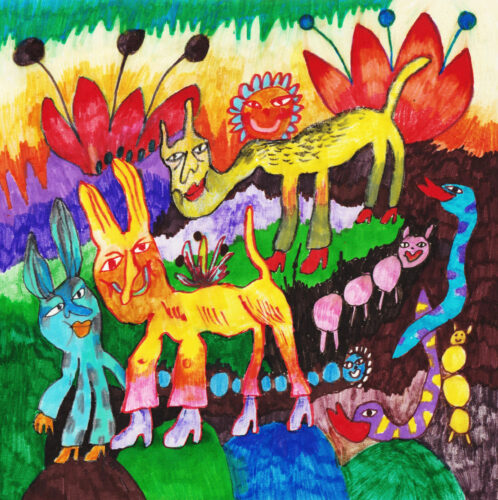
Indrė Svirplytė
- Bringing Back My True Colors
- 2023
- felt-tip pen on paper
- 21×21 cm
- courtesy of the artist
Groups of ants have a shared personality.60 An entire colony can be fearful of new environments, prudent and risk-averse. These shy colonies also tend to be less competitive.61, 62
- According to research conducted on Aphaenogaster senilis.
- Colonies with a more adventurous and aggressive personality tend to gather more resources, but they fail to respond to environmental shifts. This leads to more deaths.
- Blight et al., 2016
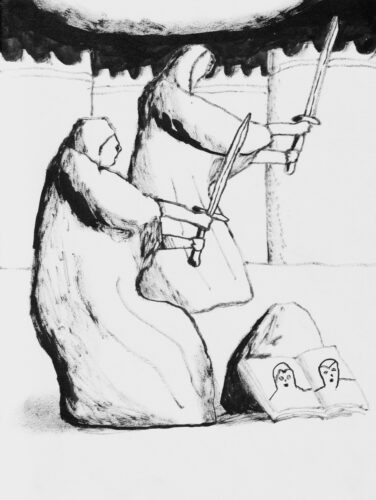
June Gutman
- Castle Front
- 2024
- ink on paper
- 30×22 cm
- courtesy of the artist
Florida wood ants57 are cunning warriors, their nests littered with the severed skulls of much larger and more aggressive trap-jaw ants.58 They stun and dismember their prey, using their scent as a cloak—a chemical disguise for the next attack.59
- Formica archboldi
- Odontomachus
- Smith, 2019

Lindsay Burke
- A Lump Like a Stone, Like the Rising Smoke
- 2021
- acrylic and flashe on canvas
- 101×76 cm
- photo by Adam Moskowitz
- courtesy of the artist and Moskowitz Bayse Gallery
Leaf-cutting ants54 construct ventilation shafts for their nests. The edible mold they cultivate underground thrives in muggy conditions,55 but the ants need a breath of fresh air every once in a while.56
- Acromyrmex ambiguus
- The nests are kept at over 90% humidity at 25–30°C. The ants also sleep here.
- Bollazzi and Roces, 2007
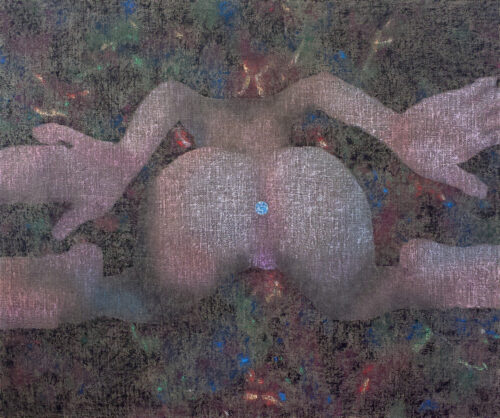
Inna Levinson
- SD//150/180/SPH/BODY/2018
- 2018
- oil on burlap
- 150×180 cm
- courtesy of the artist
Ghost ants52 have a slit-shaped, hairless anal opening.53
- Tapinoma melanocephalum
- Smith and Whitman, 1992
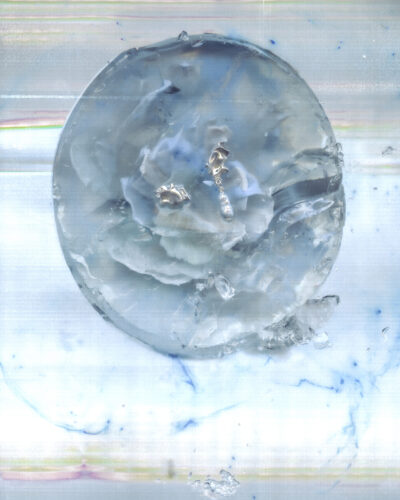
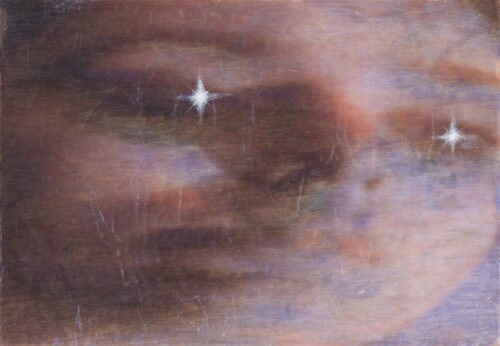
Paul Robas
- Pins and Needles
- 2023
- acrylic on canvas
- 29×41 cm
- photo by Tom Carter
- courtesy of the artist and Alice Amati London
Dracula ants49 are predators but are born completely blind. Their foreheads are smooth and lack any eye structures.50
- Adetomyrma venatrix workers
- Ward, 1994
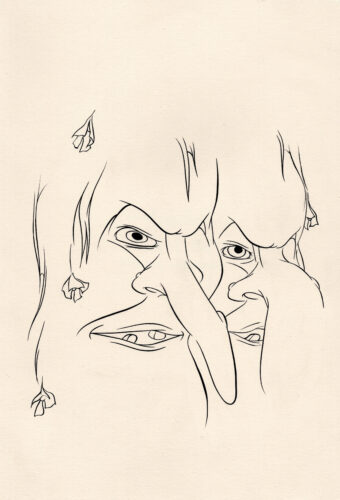
Aaron Elvis Jupin
- Never Gonna sleep (stick your finger in your eye)
- 2022
- ink and graphite on paper
- 28×19 cm
- courtesy of the artist
Ant sisters are more closely related than human sisters, sharing 75% of their genes on average.47,48
- This high degree of genetic similarity makes it evolutionarily advantageous for them to support their sisters over their brothers.
- Dawkins, 1976
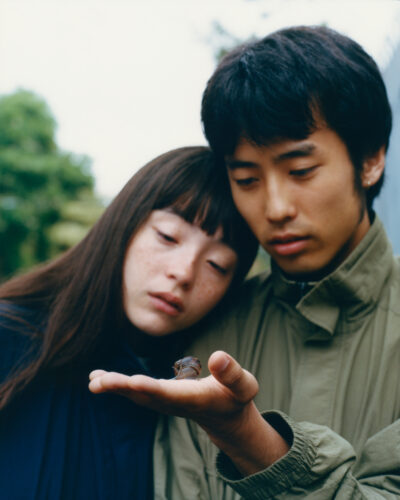
Sirui Ma
- Snail
- 2023
- photograph
- courtesy of the artist
Caterpillars often grow up surrounded by ants. They employ chemical and acoustic signals to manipulate their entourage into liking and protecting them.44 A sweet secretion is used to reward the ants for their services.45,46
- Caterpillars have developed several dedicated organs specifically for appeasing and attracting ants.
- While many caterpillars are content to trade sugar for safety, others betray their hosts by feasting on the colony’s young.
- Pierce et al., 2002
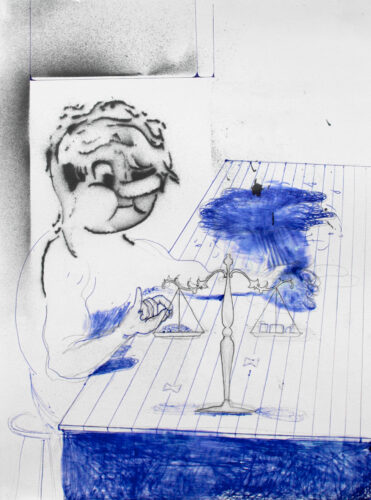
Daniel Milanese
- David Buys A Wife
- 2022
- ink and liquid graphite on paper
- 55×45 cm
- courtesy of the artist
Wood ants41 are among the only animals to create drug cocktails. By combining the formic acid produced by their own bodies with tree resin, they create a powerful antimicrobial agent to safeguard the colony from disease.42,43
- Formica paralugubris
- Large amounts of resin are brought into the nest to protect the brood from infections. As the ants grow older, will the smell of pine trees remind them of their childhood?
- Brütsch et al., 2017
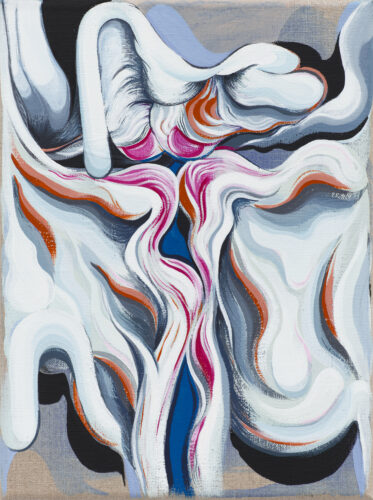
Bridget Mullen
- Birthday Series #35
- 2021
- flashe on linen
- 30×22 cm
- photo by Marten Elder
- courtesy of the artist
Male ants are often outlived by their sperm, dying just days after mating.38 The queen stores their ejaculate in a pouch-like organ and uses it to fertilize eggs for a decade or more.39,40
- According to research conducted on Crernatogaster opuntiae.
- The bean-shaped spermatheca features a precise valving system, releasing just a few sperm cells per egg.
- Wheeler & Krutzsch, 1994

Inès Di Folco
- Pablo and the roses
- 2022-2023
- oil and pigments on canvas
- 60×50 cm
- photo by Charles Benton
- courtesy of the artist, SISSI club, Marseille, and Laurel Gitlen, New York
The oldest ant on record is a Black Garden Ant queen35 who died after 28 years and nine months in captivity.36 Her daughters had a typical lifespan of just one to two years.37
- Lasius Niger
- Would she have preferred a shorter life in the forest?
- Kutter & Stumper, 1969
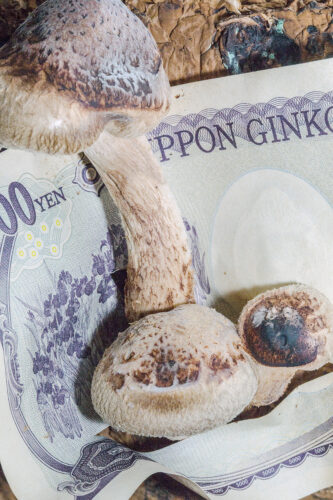
Makoto Oono
- Broken Grow
- 2015
- photograph
- courtesy of the artist
Fungus-growing Ants33 cooperate with other colonies by exchanging the edible molds grown in their underground gardens. Resilient strains get passed around, even across species lines, helping these farmers adapt to environmental changes.34
- Attini
- Mueller et al., 1998
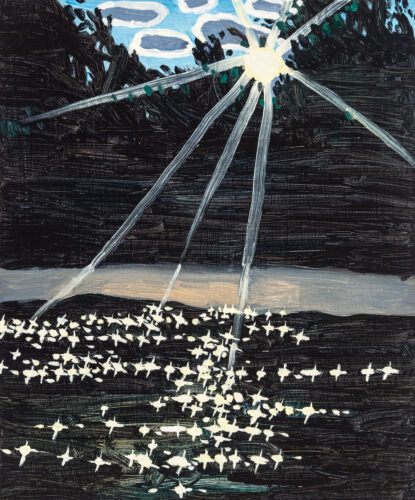
Claudia Keep
- Morning Swim
- 2022
- oil on hardwood panel
- 50×30 cm
- courtesy of the artist and March Gallery
Colonies of Fire Ants30 survive floods by linking their bodies together to form living rafts, similar to the weaving of a waterproof fabric. This traps air bubbles underneath.31 The ants can sail for months at a time as they migrate to a new home.32
- Solenopsis invicta
- Air bubbles keep the raft afloat and also ensure that the ants at the bottom rarely drown.
- Mlot et al., 2011
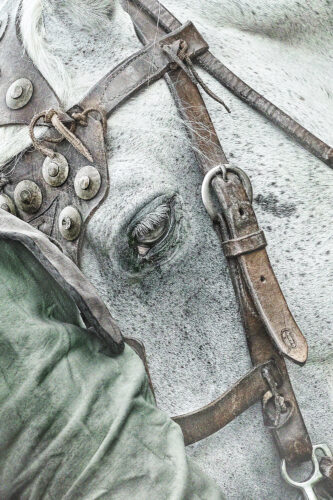
Satoshi Fujiwara
- EU II #9
- 2018
- photograph
- courtesy of the artist
As ants age, they venture further into the world.27 They start as nurses, caring for the queen and her brood, then progress to nest maintenance. Only in the final stages of their lives do they take on the dangerous task of leaving the nest to forage.28,29
- According to research conducted on Camponotus fellah.
- Age polyethism is also common among honey bees.
- Mersch, 2013
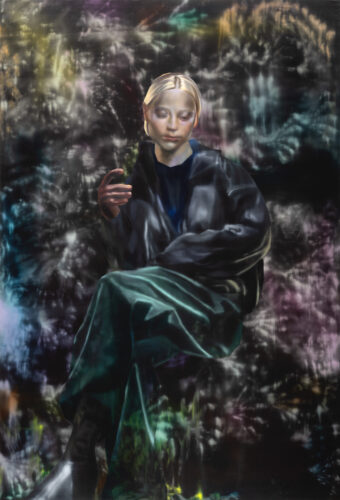
Rūtė Merk
- Gemia
- 2023
- oil on linen
- 205×140 cm
- courtesy of the artist and Tara Downs Gallery
Just over one millimeter in size, a Ghost Ant25 is easily overlooked. Her pale legs and abdomen often blend into the background, making the head and thorax look like hovering specks, unrecognizable as an ant.26
- Tapinoma melanocephalum
- Wetterer, 2009
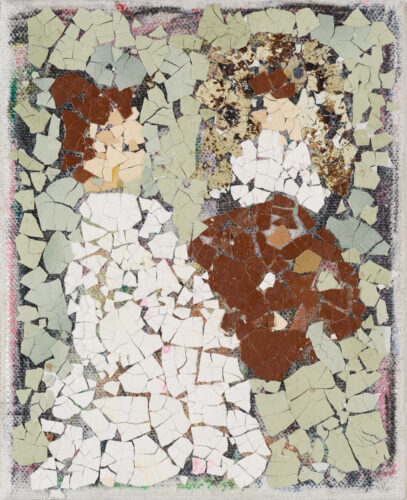
Cosima zu Knyphausen
- Einschlägige Berufserfahrung
- 2021
- egg shells on painted canvas
- 19×15 cm
- courtesy of the artist
When Fire Ants21 encounter essential balm, they collect nearby soil particles and pave over the sticky substance.22,23 They employ the same strategy to forage in areas treated with insecticides.24
- Solenopsis invicta
- Balms with essential oils are often used as insect repellents.
- Wen et al., 2021
- Wen et al., 2022
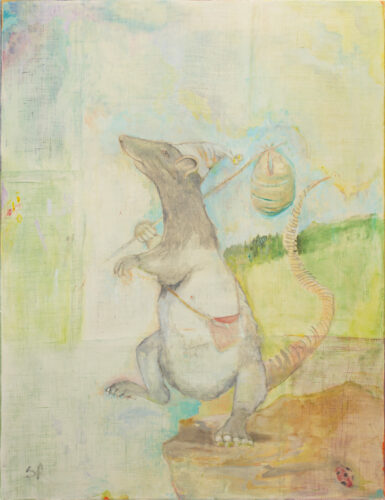
Sophie Reinhold
- Return of the fool
- 2019
- oil and marble powder on jute
- 190×140 cm
- courtesy of the artist
When an ant leaves home, she carries the distinct colony smell on her body for a long time.19 If this scent gets masked or washed off, however, her nest mates will attack her aggressively, no longer recognizing their sister.20
- According to research conducted on Prairie Mound Ants, Formica montana.
- Henderson et al., 1990
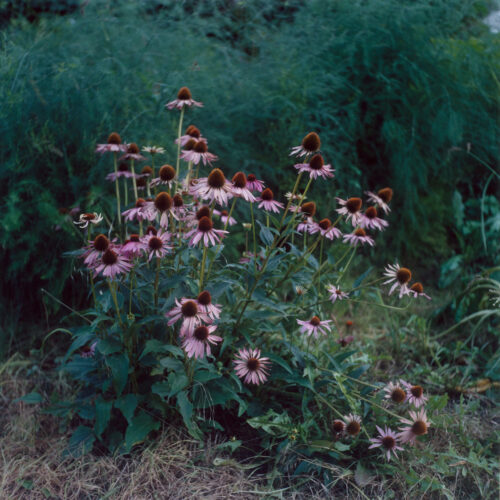
Anne Schwalbe
- Sonnenhut I
- 2014
- c-print
- 24×30 cm, edition of 20
- courtesy of the artist
Many ant species forage for seeds, which in turn affects the abundance and spread of plants.17 When a forest is cleared, ant communities get displaced, disrupting the ecosystem and changing the makeup of the undergrowth for decades.18
- Some plants have evolved elaiosomes—fleshy, nutritious bits on their seeds—to attract Harvesting Ants. The ants feed these to their larvae and discard the actual seeds in a designated waste area, where they can germinate and grow into new flowers.
- Pennisi, 2020

Joss McKinley
- Sunbeam
- 2023
- photograph
- courtesy of the artist
Dracula Ants14 practice non-destructive cannibalism. Using sharp, elongated jaws, they puncture the skin of their own larvae and feed on their blood without killing them.15,16
- Amblyoponinae
- Like other invertebrates, ants have a mostly clear blood-equivalent called hemolymph.
- Bolton, 2003

Loren Erdrich
- Not All Water Is For Drowning
- 2021
- water, raw pigment, organic and synthetic dye, and water-soluble pastel on muslin
- 122×102 cm
- courtesy of the artist and Shrine
Carpenter Ants11 die ten times quicker when isolated from their peers. They wander around and continue to gather food, likely to share it with their nest mates later, but do not digest it themselves.12 They starve to death with a full belly.13
- Camponotus fellah
- Ants have a social stomach, an organ used to store food for the colony.
- Koto et al., 2015
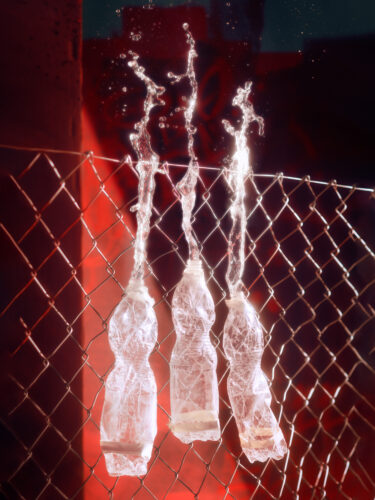
Thomas Albdorf
- Fountain (Part Five), from the series Body Double
- 2022
- photograph
- courtesy of the artist
In Malaysia, some ants8 live in the hollow internodes of giant bamboo stems. When their nest gets flooded by rain, they respond by drinking the water and excreting it on the outside of the plant.9 This strategy is known as communal peeing.10
- Cataulacus muticus
- This takes a while as they produce just one droplet at a time.
- Maschwitz & Moog, 2000
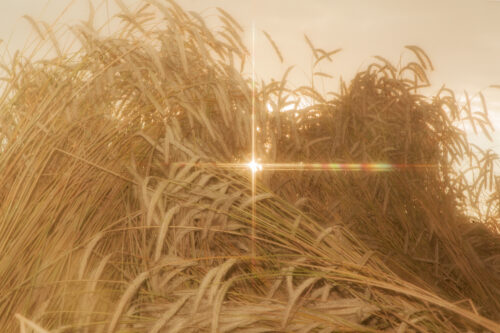
Neven Allgeier
- Environment
- 2017
- photograph
- courtesy of the artist
Desert Ants4 can navigate precisely using the sun.5 When it is obscured, they use the pattern of polarized light across the blue sky as a compass.6 They have an extra set of eyes for this.7
- Cataglyphis
- Santschi, 1911
- Fent & Wehner, 1985
- The ocelli are located on the ant’s forehead, in between her compound eyes, not unlike a magical third eye.
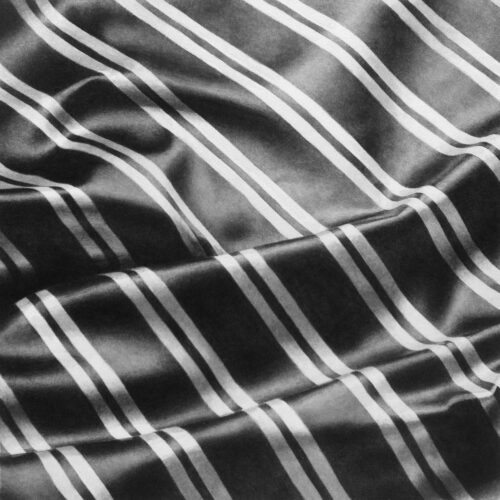
Anna Lea Hucht
- untitled
- 2013
- watercolor on paper
- 19×19 cm
- courtesy of the artist and Meyer Riegger
Fire Ants1 take around 250 naps per day, each lasting just over one minute. Some choose to sleep upside down on the ceiling. During deep sleep phases, they exhibit rapid antennal movement.2,3
- Solenopsis invicta workers
- also known as RAM sleep—which begs the question: do ants dream?
- Cassill et al., 2009